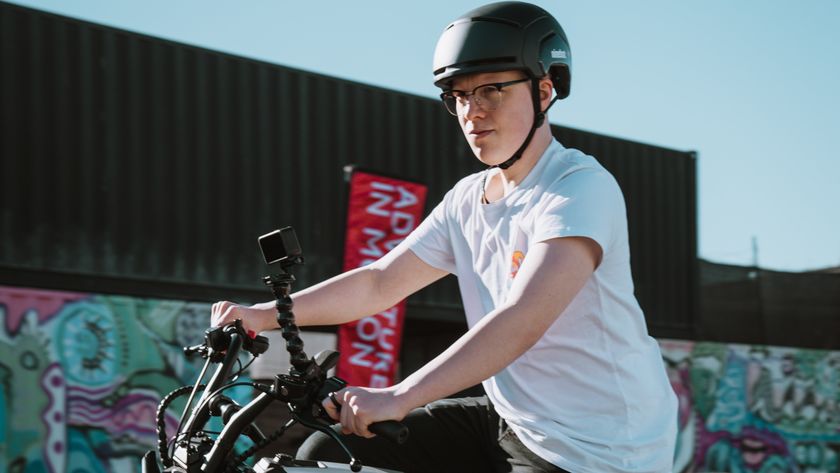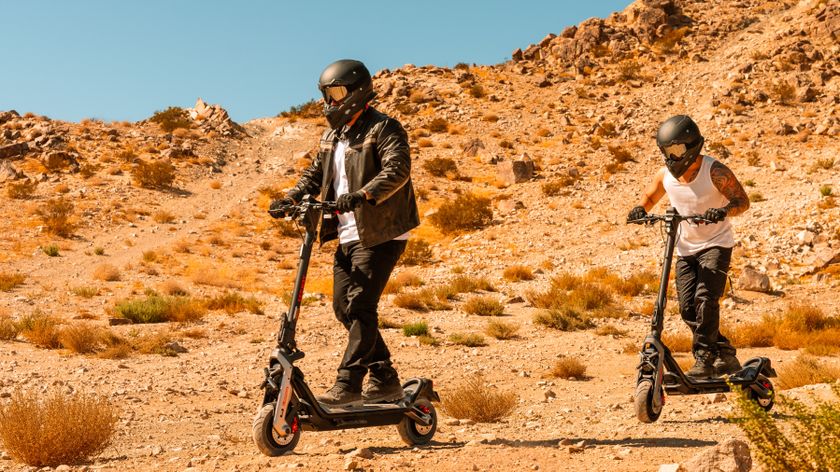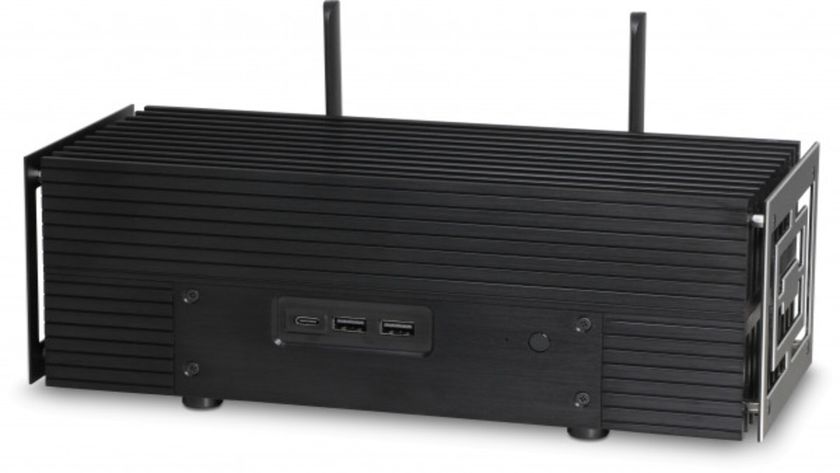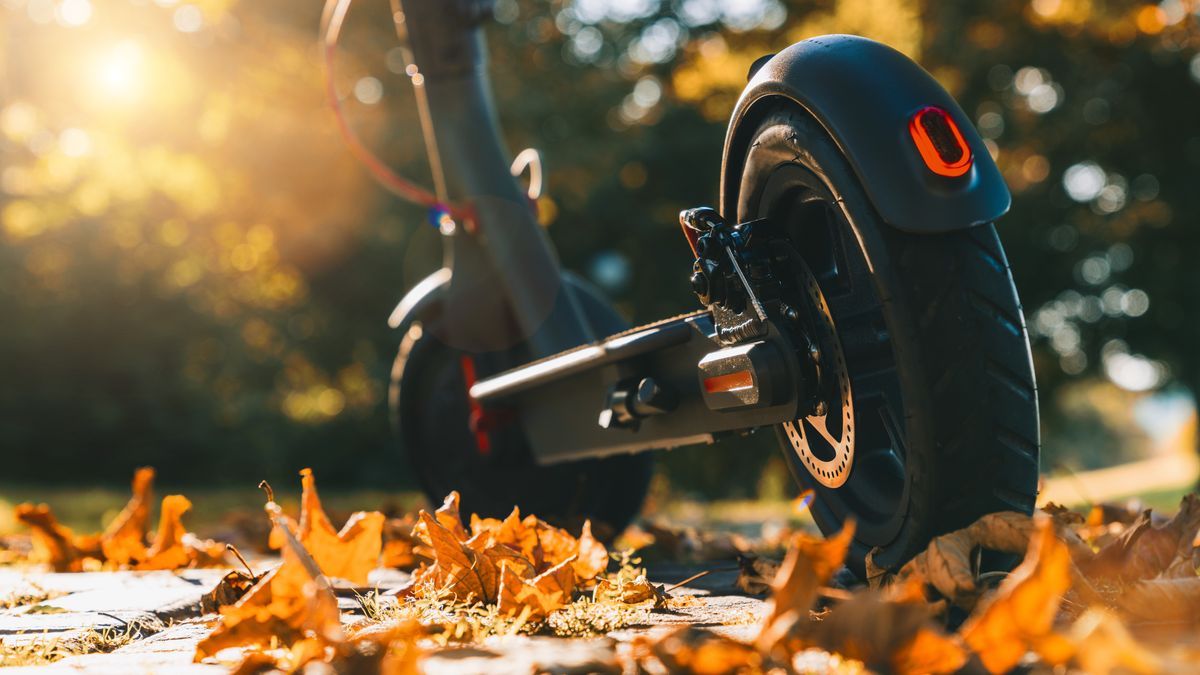
Are electric scooters safe? They can be, but only if they’re well built, have certain key safety features, are well maintained, and most importantly, are ridden well.
Buy a safe scooter
When you buy an electric scooter, it’s best to buy from a recognized retailer that will provide a warranty, and ideally offer repairs as well. This will also help you avoid shoddily made scooters, or fakes. The Xiaomi 365, for example, is a great scooter that’s enormously popular, but has a lot of doppelgangers of dubious provenance. If a price looks too good to be true, it probably is.
Now let’s take a closer look at the scooter itself, starting with the brakes. Electric scooters typically come with electric, drum/disc, or foot brakes, each of which have their pros and cons. Electric brakes are easy to use and maintain, but don’t offer the best stopping power. Disc or drum brakes work best, but will eventually wear out and need to be replaced. Foot brakes require you to actually step on the scooter’s rear mudguard to stop the wheel, which isn’t always easy and takes practice before you’ll be ready to try it on a public road.
When it comes to tires, the experts at Pure Electric say that big air-filled ones will give you a comfortable, stable ride. They also advise using puncture-protection fluid as it’s hard to repair a puncture by the roadside and scooter wheels are a pain to remove. If you’ve noticed a lot of punctures when cycling your regular route, you might be better off with solid tires and suspension to offset the jolts that result from the lack of cushioning.
Good lights are essential for safe riding. Many electric scooters feature built-in lights, but if yours only has reflectors or a rear light, invest in a decent set designed for bikes. They don’t have to be fancy; you can get an effective set of LEDs that attach to your scooter with rubber straps that won’t damage its paintwork.
It’s not a cool look, but some form of high-viz or reflective clothing will also make it much easier for drivers to spot you if it’s getting dark.
A helmet is a wise investment too, even if it’s not a legal requirement where you live. It won’t protect you in a close encounter of the vehicular kind, but if you lose your balance, it can stop you smacking your head on the curb.
Get daily insight, inspiration and deals in your inbox
Sign up for breaking news, reviews, opinion, top tech deals, and more.
Ride carefully
So you’ve got your new scooter home and charged it up – now it’s time to find somewhere safe and quiet to practice. You might not need to take a test before your maiden voyage, but it’s a good idea to build your confidence before taking to the streets.
An empty parking lot is a good choice if there’s one near you. Get used to unfolding and folding your scooter, powering it up, kicking off, balancing, steering and, perhaps most importantly, braking. There’s no rush – take your time. If you’re about to fall, jumping off is often the safest course of action. You won’t protect the scooter by going down with it.

When you're riding, don't lock your knees – you should be able to respond to the road below you as you move. Bending your knees slightly will help lessen the jolts as you move over rough surfaces, as will raising your heels ever so slightly.
Always look ahead, and plan the safest line possible over the next few meters. Being aware of what's coming up will help you avoid hazards and obstacles. Don't ride with headphones or anything that will distract you.
Take care in the rain
First, bear in mind that not all electric scooters are fully waterproof. Before buying one, make sure you find its Ingress Protection (IP) rating. This will be a two digit number – for example 65 – where the first digit represents its resistance to ingress of solid objects on a scale of 1-6, and the second number is the resistance to moisture ingress on a scale of 1-9.
A moisture protection rating of 1 means that the scooter is only resistant to vertically falling droplets, such as atmospheric condensation. For protection against rain, you’ll need to look for a rating of at least 5, which covers ‘low pressure jets’ of directed water from any angle, and is classed as ‘water resistant’.
Also check out the scooter’s warranty before taking it out on a rainy day; you may find that you’re only covered if you ride it in dry conditions.
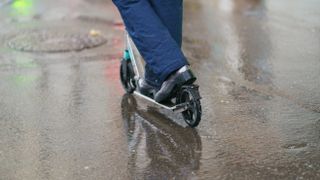
If riding in the rain, make sure your scooter’s lights are on for visibility. As mentioned previously, you can pick up a set of LED lights from a bike shop that will make you hard to miss on the road.
When riding, always avoid puddles – it’s impossible to tell how deep they are, and an electric scooter’s low ground clearance means you’re likely to come off if you hit a hidden pothole.
Keep on top of maintenance
Just as a bicycle needs regular maintenance to keep it running smoothly and avoid serious (potentially dangerous) problems down the road, your electric scooter will need a little TLC now and then.
Giving your scooter a wash every now and then is a sensible idea, though check its IP rating first to make sure it's water resistant, as described above, and don't use a pressure washer or high-pressure hose. This is important to get rid of general grime, and anything potentially corrosive that could cause damage if left in place.
As mentioned above, puncture protection fluid is a good idea. It sloshes around inside the tire and clogs up punctures before the tire can go flat.
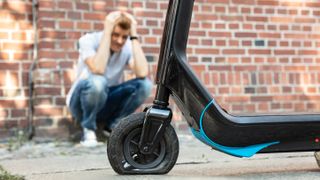
It's also important to check your scooter's tire pressure if it has air-filled rather than solid tires. You can do this using a bike pump with a pressure gauge. You should be able to find the right PSI written on the tire wall. If not, check the scooter's manual, or the manufacturer's website.
While you're at it, take this opportunity to inspect the tires for signs of wear and damage. If the grooves in the surface are starting to wear away, it's time to replace the tires. Also look for anything that might be stuck in the tire, like a stone or thorn, which could be just waiting to puncture the inner tube.
If your scooter has disc or drum brakes, you should also check these for signs of wear. Doing this every couple of weeks should be sufficient.
Know the law
Countries, states and cities all have their own laws that are designed to protect scooter riders, pedestrians, cyclists and other road users, but they vary enormously
Part of the problem is that electric scooters often don’t fit neatly into existing traffic laws. Sometimes they can only be ridden on roads and cycle lanes, while in other places they must be kept off the roads. In most territories the maximum speed of a street-legal electric scooter is capped at 15mph, but there are exceptions. There’s not yet any established best practice.
Nor is it clear where insurance comes in – particularly for third parties who might be injured in an accident. In Illinois, e-scooter riders must have liability insurance covering damage to third parties, but most territories have no such rules.
Electric scooter accidents can, and have, seriously injured third parties – sometimes, sadly, fatally. Peter Kelly, a personal injury legal director at Lime Solicitors, told TechRadar that the legal issues and liabilities are more or less the same as those applying to people driving cars: “Any type of motorized vehicle becomes a serious danger above minimal speeds, and sadly it’s inevitable that there are going to be accidents.”
By following the advice above, you can minimize the chance that one of those accidents will involve you.
- The best exercise machine deals and the best treadmill deals
- Electric scooter deals: all the latest savings

Cat is TechRadar's Homes Editor specializing in kitchen appliances and smart home technology. She's been a tech journalist for 15 years and is an SCA-certified barista, so whether you want to invest in some smart lights or pick up a new espresso machine, she's the right person to help.
